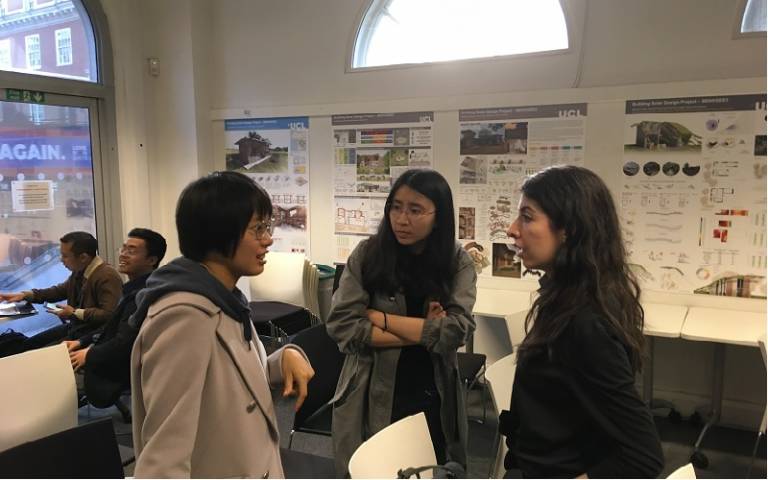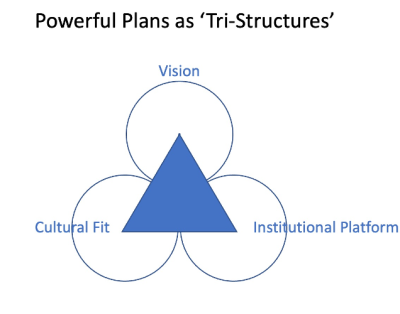Reflections from the Bartlett School of Planning Research Day
29 July 2023
On 23rd May 2023 the Bartlett School of Planning (BSP) held our annual Research Day, a day of presentations and discussion about current research being undertaken in the department.

Our Research Day focused on sustainability, inequalities, and planning for placemaking and comprised two sessions. The day's Discussants, Dr Lucy Natarajan and Dr Danielle Sanderson, give their overview and reflections of each session below.
Session one, 'Planning for Climate Change and Sustainbility', by Dr Lucy Natarajan:
The first session began with presentations by Prof Jo Williams and Prof Catalina Turcu who showcased their remarkable dedication to sustainability research and their involvement in numerous projects with international partnerships.
Jo highlighted the significance of the concept of 'Living Systems' design, innovative approaches to food supply, and dealing with contaminated spaces.
Both Jo and Catalina discussed the Transitions Towns movement, particularly examples like repair cafes, were discussed as a means of embedding work culturally and connecting with ordinary people. The urgent need for addressing environmental challenges, caused by population growth, waste, and consumption, was stressed, along with the importance of finding ways to effect transformative change and address global inequalities. Despite dire urgency, movement for change is slow even where environmental decline impacts us directly.
“If ever there was a universal public interest this is perhaps it.
Another significant theme regarding the proposed sustainability agendas is that of global inequalities. When we discuss change in the context of urban amenity, such as energy demand and travel patterns, it becomes apparent that there are considerable imbalances in the distribution of costs and benefits resulting from current continuous growth. The stark disparities in mortality rates globally and the economic gains from urban development are evident.
Despite these glaring disparities, it appears that no one is taking the lead on the global justice agenda. During the last meeting of the 27th Committee of the parties or COP 27, the establishment of 'loss and damage funds' was agreed upon. However, this approach creates an opportunity for wealthier countries to essentially buy their way out of responsibility for poor practices, perpetuating a trade on misery. This approach does not offer a clear direction for real change.
Both Catalina and Jo highlighted the role of governance and planning in addressing sustainability challenges. They showcased local leadership examples, where communities collaboratively worked on sustainable initiatives. Around our UCL neighbourhood, we can point for instance, to the plans for a highline using existing abandoned infrastructure/railway lines, and green loop. We often hear about the lack of scaling up from smaller scale initiatives. But whether globally or locally, the main challenge for projects is perhaps more simply how to sustain efforts over the long term. After all, we do need to think long term even if we want urgent change.
I believe long term fundamental shifts are possible, and the role of the state is important. What examples and explanations do we have of positive and sucessful change? I have been thinking about this over the past few years, and tried to answer that question with international examples. Studies from USA, Europe, China and India were compiled into a special issue on the Power of Plans (Wray & Natarajan, 2022). In each study, there was a plan that had helped effect major positive change. Together the set of studies evidenced the importance of learning from mistakes, and the importance of maintaining a strategy over the long-term. Authors shared the secret of successes, and it was clear that three things had been critical: Vision, Institutional Platform, and cultural fit. A ‘Tri-structure’ if you will.

Figure from https://www.alexandrinepress.co.uk/built-environment/power-plans-0
In reflecting on the Tri-Structure, the endurance of vision was pivotal. We know that half of RTPI members now work in private practice, where there is a reductive effect of having to sell a vision to funders. Government and market actors had provided institutional platforms as funders and backers of visions, here too there was erosion of vision. Notably, where a vision had been supplied outside a territory, such as the European Union it lost its power even when it was translated into a local scale.
Sustainability studies can consider more explicitly not only what supports the emergence of plans but what erodes vision over time. Our sustainable urbanism work is strong. We have developed and promoted understandings of what needs to change, and demonstrated actions that help decouple from unsustainable practices. To further consolidate this, we can connect those understandings to questions around the endurance of vision.
- In living systems or transformative frames, where is leadership infused with sustainable choices?
- When plans are produced, how do they find institutional backing?
- How do we explain the erosion or longevity of the underpinning visions?
Ultimately, these are global questions, they cannot be answered by lone scholars, or single cases. Instead, we should explore leadership through research partnerships, around sustainable endeavours and plan that endure.
Session two, 'Inequalities and Planning for Place-making' from Dr Danielle Sanderson
In the second session of the fascinating research day, Prof Matthew Carmona discussed the research he and Valentina Giordano have been conducting over many years into Housing design inequality, and Dr Lauren Andres described her projects that have examined themes of adaptable urbanism and unequal cities in the light of new and ongoing crisis.
Mathew’s presentation described the evolution of the UK design quality agenda and how Place Alliance fits in with that. He explained the findings of an audit into 142 large-scale housing schemes across the country, and the unfortunate assessment that three-quarters of schemes were “mediocre or worse”. When questioned whether this might be re-phrased as “four-fifth of schemes were mediocre or better” and that the emotive term “mediocre” has negative connotations, Matthew defended its use and said that this has been influential in new design codes. The assessment of the housing schemes was based on 17 design considerations, such as security, community facilities, connectivity, and transport options. The research also demonstrated mutual benefit for all stakeholders, with houses in well-designed schemes selling at a premium.
Matthew also talked about some research into the impact of the pandemic on home comfort – a 25-question survey to which 2500 people responded. This highlighted the importance of access to open space, the need for adequate, appropriate indoor space, and provision of amenities within walking distance. Unsurprisingly, home-owners gave higher ratings than renters, while those in high-rise and/or newer neighbourhoods have lower scores. Matthew then discussed ways to achieve better designed schemes, including adherence to design codes and conducting design reviews.
Lauren has been involved in several research projects over the past few years, with particular emphasis on the impacts of the pandemic. Her research into Adaptable Urbanism & Unequal Cities includes many case studies into bottom-up strategies for improving the quality of life in communities, such as Open Streets, “meanwhile uses”, Low Traffic Neighbourhoods, and community gardening initiatives. Another major piece of comparative research has looked at the impacts of Covid-19 on children across England, South Africa & Brazil, focusing on Food, Education, and Play. Lauren has devised frameworks for analysis such as the use of “Adaptability and Temporariness as a lens to read cities”, looking at aspects such as the degree of formality; power, rights, and governmentality; path dependence and legacy; intersectionality; and temporality.
Her presentation gave examples of bespoke approaches to community creation, but highlighted how successful initiatives require community organisation, resources, and support. The pandemic allowed for fast-tracking of some initiatives, accelerating some projects, and providing a “Lab for testing changes”. Some communities reacted and implemented schemes with agility and there are case studies from which others can learn, but the pandemic impacted people unequally, especially the poor, in small houses, without access to green space, who were ill-equipped for home schooling.
The research described by Matthew and Lauren aligns closely with several of the BSP Priority Agendas, including Cities & Climate Emergency, Designing & Sustaining Liveable Cities, Inequalities in Design / Impact on Wellbeing & Happiness, Diverse & Unequal cities, Social Justice & Inclusion, Diversity & Urban Inequalities, Health & Liveable Environments, Impacts of Pandemics, and Community / Citizenship – Outreach.
The research Day concluded with a panel Discussion: 'Future Directions for Planning Research' in which Dr Ben Clifford, Prof Robin Hickman, Dr Susan Moore, and Dr Fangzhu Zhang gave us insights into their research. The variety of areas of study within the Department is impressive. Of particular note is the way in which small research grants and taking advantage of serendipity can evolve into major projects with widespread impact on society.
Thank you to all those who participated and joined us. All are welcome at our annual research days. Sign up to our events mailing list to stay updated on the next iteration and other departmental events.
 Close
Close

